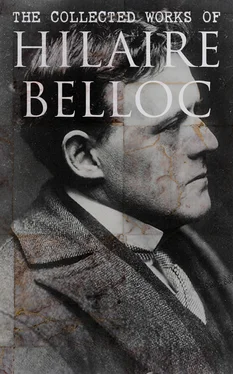When I had become a little morose at their perpetual laughter, I asked for a bed, and the landlady, a woman of some talent, showed me on her fingers that the beds were 50c., 75c., and a franc. I determined upon the best, and was given indeed a very pleasant room, having in it the statue of a saint, and full of a country air. But I had done too much in this night march, as you will presently learn, for my next day was a day without salt, and in it appreciation left me. And this breakdown of appreciation was due to what I did not know at the time to be fatigue, but to what was undoubtedly a deep inner exhaustion.
When I awoke next morning it was as it always is: no one was awake, and I had the field to myself, to slip out as I chose. I looked out of the window into the dawn. The race had made its own surroundings.
These people who suffocated with laughter at the idea of one's knowing no German, had produced, as it were, a German picture by the mere influence of years and years of similar thoughts.
Out of my window I saw the eaves coming low down. I saw an apple-tree against the grey light. The tangled grass in the little garden, the dog-kennel, and the standing butt were all what I had seen in those German pictures which they put into books for children, and which are drawn in thick black lines: nor did I see any reason why tame faces should not appear in that framework. I expected the light lank hair and the heavy unlifting step of the people whose only emotions are in music.
But it was too early for any one to be about, and my German garden, _si j'ose m'exprimer ainsi,_ had to suffice me for an impression of the Central Europeans. I gazed at it a little while as it grew lighter. Then I went downstairs and slipped the latch (which, being German, was of a quaint design). I went out into the road and sighed profoundly.
All that day was destined to be covered, so far as my spirit was concerned, with a motionless lethargy. Nothing seemed properly to interest or to concern me, and not till evening was I visited by any muse. Even my pain (which was now dull and chronic) was no longer a subject for my entertainment, and I suffered from an uneasy isolation that had not the merit of sharpness and was no spur to the mind. I had the feeling that every one I might see would be a stranger, and that their language would be unfamiliar to me, and this, unlike most men who travel, I had never felt before.
The reason being this: that if a man has English thoroughly he can wander over a great part of the world familiarly, and meet men with whom he can talk. And if he has French thoroughly all Italy, and I suppose Spain, certainly Belgium, are open to him. Not perhaps that he will understand what he hears or will be understood of others, but that the order and nature of the words and the gestures accompanying them are his own. Here, however, I, to whom English and French were the same, was to spend (it seemed) whole days among a people who put their verbs at the end, where the curses or the endearments come in French and English, and many of whose words stand for ideas we have not got. I had no room for good-fellowship. I could not sit at tables and expand the air with terrible stories of adventure, nor ask about their politics, nor provoke them to laughter or sadness by my tales. It seemed a poor pilgrimage taken among dumb men.
Also I have no doubt that I had experienced the ebb of some vitality, for it is the saddest thing about us that this bright spirit with which we are lit from within like lanterns, can suffer dimness. Such frailty makes one fear that extinction is our final destiny, and it saps us with numbness, and we are less than ourselves. Seven nights had I been on pilgrimage, and two of them had I passed in the open. Seven great heights had I climbed: the Forest, Archettes, the Ballon, the Mont Terrible, the Watershed, the pass by Moutier, the Weissenstein. Seven depths had I fallen to: twice to the Moselle, the gap of Belfort, the gorge of the Doubs, Glovelier valley, the hole of Moutier, and now this plain of the Aar. I had marched 180 miles. It was no wonder that on this eighth day I was oppressed and that all the light long I drank no good wine, met no one to remember well, nor sang any songs. All this part of my way was full of what they call Duty, and I was sustained only by my knowledge that the vast mountains (which had disappeared) would be part of my life very soon if I still went on steadily towards Rome.
The sun had risen when I reached Burgdorf, and I there went to a railway station, and outside of it drank coffee and ate bread. I also bought old newspapers in French, and looked at everything wearily and with sad eyes. There was nothing to draw. How can a man draw pain in the foot and knee? And that was all there was remarkable at that moment.
I watched a train come in. It was full of tourists, who (it may have been a subjective illusion) seemed to me common and worthless people, and sad into the bargain. It was going to Interlaken; and I felt a languid contempt for people who went to Interlaken instead of driving right across the great hills to Rome.
After an hour, or so of this melancholy dawdling, I put a map before me on a little marble table, ordered some more coffee, and blew into my tepid life a moment of warmth by the effort of coming to a necessary decision. I had (for the first time since I had left Lorraine) the choice of two roads; and why this was so the following map will make clear.
Here you see that there is no possibility of following the straight way to Rome, but that one must go a few miles east or west of it. From Burgundy one has to strike a point on the sources of the Emmen, and Burgdorf is on the Emmen. Therefore one might follow the Emmen all the way up. But it seemed that the road climbed up above a gorge that way, whereas by the other (which is just as straight) the road is good (it seemed) and fairly level. So I chose this latter Eastern way, which, at the bifurcation, takes one up a tributary of the Emmen, then over a rise to the Upper Emmen again.
Do you want it made plainer than that? I should think not. And, tell me--what can it profit you to know these geographical details? Believe me, I write them down for my own gratification, not yours.
I say a day without salt. A trudge. The air was ordinary, the colours common; men, animals, and trees indifferent. Something had stopped working.
Our energy also is from God, and we should never be proud of it, even if we can cover thirty miles day after day (as I can), or bend a peony in one's hand as could Frocot, the driver in my piece--a man you never knew--or write bad verse very rapidly as can so many moderns. I say our energy also is from God, and we should never be proud of it as though it were from ourselves, but we should accept it as a kind of present, and we should be thankful for it; just as a man should thank God for his reason, as did the madman in the Story of the Rose, who thanked God that he at least was sane though all the rest of the world had recently lost their reason.
Indeed, this defaillance and breakdown which comes from time to time over the mind is a very sad thing, but it can be made of great use to us if we will draw from it the lesson that we ourselves are nothing. Perhaps it is a grace. Perhaps in these moments our minds repose ... Anyhow, a day without salt.
You understand that under (or in) these circumstances--
When I was at Oxford there was a great and terrible debate that shook the Empire, and that intensely exercised the men whom we send out to govern the Empire, and which, therefore, must have had its effect upon the Empire, as to whether one should say 'under these circumstances' or 'in these circumstances'; nor did I settle matters by calling a conclave and suggesting _Quae quum ita sint_ as a common formula, because a new debate arose upon when you should say _sint_ and when you should say _sunt,_ and they all wrangled like kittens in a basket.
Читать дальше












